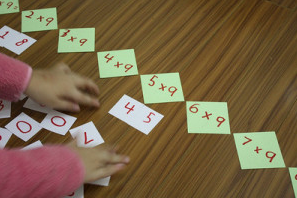Math and the brain: Memorization is overrated, says education expert
Written by Andrea Ford
Article Source: http://scopeblog.stanford.edu/2015/02/03/math-and-the-brain-memorization-is-overrated-says-education-expert/
February 3rd, 2015
Remember being drilled multiplication tables? Or taking a timed math exam? These have been common activities in school, but Stanford experts say they’re not really helpful to kids learning math facts. In fact, they deter students who might otherwise be excellent mathematicians.
Jo Boaler, PhD, is a professor of mathematics education and lead author on a new working paper, “Fluency without Fear.” As part of the research, educators looked at MRI scans of students who are better and worse at math memorization. The only difference in the brain shows up in the hippocampus, the working memory center, leading researchers to believe that there are no differences in math ability, analytical thought, or IQ between the groups. Moreover, the working memory shuts down when under stress. This makes it harder to recall facts when under time pressure, and seems to particularly affect high-achieving and female students.
Boaler’s research shows that students are better at math when they’ve developed “number sense,” or the ability to use numbers flexibly and understand their logic, which comes from relaxed, enjoyable, and exploratory work. Investigators found that high-achievers actually use number sense, and not rote memorization; likewise, it’s not that low-achieving students know less, but that they don’t use numbers flexibly.
Boaler told Stanford News, “They have been set on the wrong path, often from an early age, of trying to memorize methods instead of interacting with numbers flexibly… Number sense is the foundation for all higher-level mathematics.”
So, good math students are not necessarily fast math students, which is a common misconception. In fact, many mathematicians are slow with numbers, because they think carefully about them. The danger is that kids who aren’t fast with math sometimes become convinced they’re not good at it, and they turn away.
Compare times-tables drilling with how English is commonly taught. Students learn words by using them in many different settings: reading novels or poetry, writing thoughtful pieces, speaking about their thoughts or observations. “No English student would say or think that learning about English is about the fast memorization and fast recall of words,” says Boaler.
Boaler teaches a class for educators, “How to learn math,” in which she encourages a variety of math activities, including those that focus on the visual representation of number facts. Visual and symbolic number associations use different pathways in the brain, and connecting them deepens learning, as shown by recent brain research.
Photo by Jimmie


